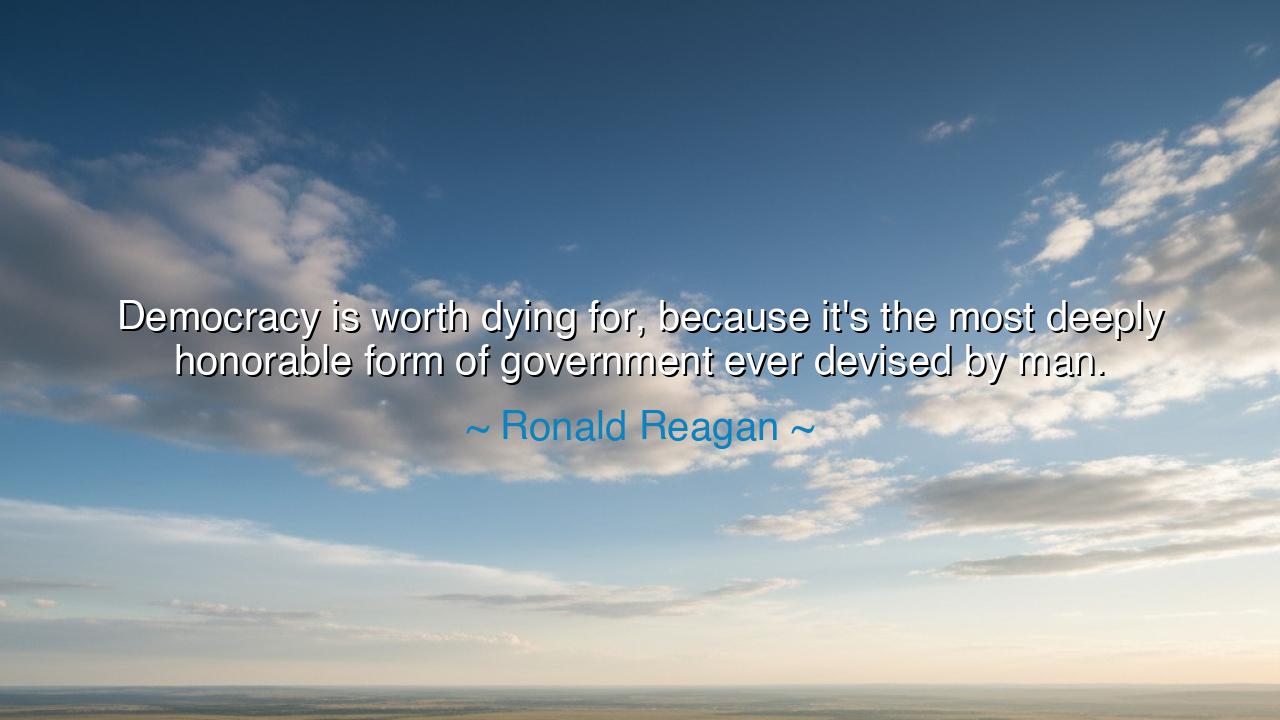
Democracy is worth dying for, because it's the most deeply
Democracy is worth dying for, because it's the most deeply honorable form of government ever devised by man.






"Democracy is worth dying for, because it's the most deeply honorable form of government ever devised by man." So spoke Ronald Reagan, and his words echo through the corridors of time like the steady beat of a drum calling free souls to remembrance. In this saying, the essence of human dignity is bound to the sacred duty of self-governance. For democracy, unlike all other systems forged by power or fear, is a covenant — between the governed and those who serve, between the living and the yet unborn. It is the recognition that every soul bears within it a spark of divine right, a voice that must not be silenced. To die for democracy, then, is not to perish for a flag or a throne, but for the eternal idea that no man is master over another’s destiny.
In the ancient world, the seed of this idea was planted upon the soil of Athens, where citizens gathered under open skies to speak their minds and chart their collective fate. There, amid marble and dust, the notion was born that liberty is not granted by kings but secured by the courage of the people. Yet such freedom was never without cost. When Persian legions threatened the Greek city-states, men like Leonidas and his Spartans stood at Thermopylae, not for conquest, but for the right to live as free men. Their sacrifice whispered across the ages, proclaiming that freedom — and the democratic soul that springs from it — demands both vigilance and valor.
Reagan’s words were spoken not in the heat of battle, but in the shadow of the Cold War, when the world trembled between tyranny and liberty. He understood that democracy is not merely a system of laws, but a moral endeavor — a declaration that truth and justice belong not to the powerful, but to the people themselves. To die for such a cause is not tragedy; it is testimony. For those who give their lives to preserve the voice of the people become immortal in the conscience of nations.
Consider the quiet bravery of those who stood before tanks in Tiananmen Square, or the soldiers who stormed the beaches of Normandy. They did not fight for empire, nor for gold, but for the right of men and women to speak freely, to dream openly, to live without fear. Each act of courage, each life laid down, became a stone upon which the temple of democracy was built — a temple without walls, resting in the hearts of free people everywhere.
Democracy, in Reagan’s view, was honorable because it required both restraint and faith. It calls upon rulers to serve rather than command, and upon citizens to act not in selfishness but in shared purpose. It is the form of government that most respects the soul’s yearning for fairness, for the chance to rise or fall by one’s own merit. And so, its honor lies not in its perfection — for it is often messy, flawed, and slow — but in its humility: it trusts the people even when they falter.
The meaning of Reagan’s words, therefore, transcends politics. It is a meditation on sacrifice — on the idea that some things are greater than comfort or even life itself. A person who loves democracy loves humanity, for in its promise lies the recognition that every being, no matter how humble, carries infinite worth. The death of one for the sake of many becomes the seed of renewal, the breath that keeps liberty alive.
From this, the lesson is clear: freedom cannot be inherited without gratitude, nor preserved without action. To honor democracy is to speak truth, to vote with conscience, to defend justice even when it is unpopular. It is to raise one’s children not as subjects, but as citizens — guardians of the flame. The call is not merely to die for democracy, but to live for it daily, through integrity, compassion, and courage.
And so, let the words of Reagan be inscribed upon our hearts: Democracy is worth dying for. Let us remember that the truest way to honor those who gave their lives for freedom is to use ours wisely — to build, to protect, and to pass on this sacred trust. For the dream of democracy lives only as long as men and women believe that it is worth not just dying for, but living for, together.






AAdministratorAdministrator
Welcome, honored guests. Please leave a comment, we will respond soon